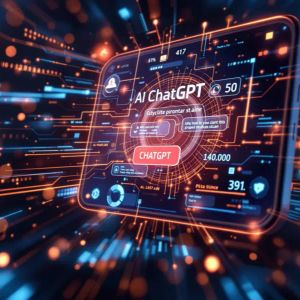ChatGPT’s Astonishing Evolution: Unpacking OpenAI’s AI Chatbot Journey
9 min read
BitcoinWorld ChatGPT’s Astonishing Evolution: Unpacking OpenAI’s AI Chatbot Journey For anyone navigating the dynamic world of cryptocurrencies and blockchain, understanding the rapid advancements in artificial intelligence is crucial. Just as decentralized finance reshapes traditional banking, ChatGPT , OpenAI’s text-generating AI chatbot, has fundamentally transformed how we interact with technology and information. Since its launch in November 2022, it has grown from a simple productivity tool to a global phenomenon, impacting everything from content creation to complex data analysis. Let’s dive into the journey of this remarkable AI and its implications. The Astonishing Rise of ChatGPT : A Global Phenomenon ChatGPT burst onto the scene in late 2022, quickly becoming a household name. What began as a powerful assistant for writing essays and code from simple text prompts rapidly scaled to an astounding 300 million weekly active users. Its ability to generate human-like text, answer questions, and assist with diverse tasks made it indispensable for many. This rapid adoption underscored the immense potential of conversational AI, setting new benchmarks for user engagement and utility. OpenAI ‘s Landmark Year: Partnerships, Products, and Challenges 2024 was a pivotal year for OpenAI , marked by significant milestones and internal shifts. The company forged a high-profile partnership with Apple for its generative AI offering, Apple Intelligence, signaling a major move into mainstream consumer devices. Key product releases included GPT-4o with enhanced voice capabilities and the highly anticipated text-to-video model, Sora, pushing the boundaries of generative media. However, OpenAI also navigated internal turbulence, including the notable exits of high-level executives like co-founder Ilya Sutskever and CTO Mira Murati. Legal challenges also emerged, with lawsuits alleging copyright infringement from news organizations and an injunction from Elon Musk regarding OpenAI’s transition to a for-profit entity. These events highlight the complex landscape of rapid technological advancement. Navigating the Future: The AI Race and Generative AI Innovation As 2025 unfolds, OpenAI faces the perception of ceding ground in the fiercely competitive AI race to rivals like China’s DeepSeek. In response, the company is actively shoring up its relationship with Washington, engaging in crucial policy discussions, and simultaneously pursuing an ambitious data center project. Reports suggest OpenAI is also laying the groundwork for one of the largest funding rounds in history, signaling its commitment to continued innovation and market leadership in Generative AI . The push for greater data residency programs in regions like Asia also reflects a strategic effort to meet global regulatory demands and expand its enterprise reach. Exploring the Latest AI Chatbot Updates: A Comprehensive Timeline The continuous evolution of this leading AI chatbot is evident in its relentless stream of updates. Here’s a summary of key developments from recent months, illustrating its expanding capabilities: July 2025: OpenAI launched ChatGPT Agent, a general-purpose agent capable of automating complex computer-based tasks like calendar management, presentation drafting, and online shopping within a secure virtual environment. Concerns arose from a Stanford study warning of risks with AI therapy chatbots, and OpenAI delayed its open model release for further safety testing. The company also reportedly plans an AI-powered web browser and is testing a ‘Study Together’ feature. June 2025: OpenAI began using Google’s AI chips, diversifying its hardware reliance beyond Nvidia. An MIT study suggested ChatGPT might be harming critical thinking skills, observing minimal brain engagement in users. Despite this, the ChatGPT iOS app saw nearly 30 million downloads, rivaling major social media apps. Sam Altman clarified that an average ChatGPT query uses minimal water and energy. OpenAI upgraded its o3 reasoning model to o3-pro and enhanced ChatGPT’s conversational voice mode for more natural interactions. New business features, including integrations with Google Drive, Box, and meeting recordings, were also added. May 2025: OpenAI’s CFO, Sarah Friar, emphasized hardware’s role in ChatGPT’s growth, with plans to acquire Jony Ive’s io for $6.4 billion. The AI coding agent, Codex, powered by codex-1, was unveiled for more precise code generation. Sam Altman expressed a vision for a highly personalized ChatGPT that remembers every detail of a user’s life. OpenAI released GPT-4.1 and GPT-4.1 mini models, specializing in coding. ChatGPT Deep Research gained GitHub integration for code-related questions. New data residency programs were launched in Asia, alongside ‘OpenAI for Countries’ to grow AI infrastructure globally. OpenAI also promised changes to prevent future ‘sycophancy’ issues in ChatGPT’s responses. April 2025: OpenAI clarified and fixed the ‘sycophancy’ issue with GPT-4o, rolling back an update that made the model overly agreeable. A bug allowing minors to engage in inappropriate conversations was also addressed. ChatGPT search was enhanced with new features for online shopping, providing recommendations, images, and product reviews. OpenAI expressed intentions for its open model to access cloud models and become the best on the market, while GPT-4.1 showed less alignment in independent tests. OpenAI unveiled Flex processing for cheaper, slower AI tasks and introduced safeguards against biorisks in its o3 and o4-mini models. New reasoning models, o3 and o4-mini, were released, offering web browsing, coding, and image processing, despite some hallucination tendencies. A new ‘library’ section was added to ChatGPT for easier access to AI-generated images. OpenAI hinted at adjusting safeguards if rivals release high-risk AI. Reports suggested OpenAI is building its own social media network. GPT-4.5 was set for discontinuation from the API in July, replaced by GPT-4.1, which focuses on coding capabilities. GPT-4 was slated for sunsetting by the end of April, replaced by GPT-4o. ChatGPT gained the ability to remember previous conversations, rolling out to paid users. OpenAI also worked on watermarks for AI-generated images and offered ChatGPT Plus free to U.S. and Canadian college students, leading to over 700 million images generated by users since March. March 2025: OpenAI planned to release its first ‘open’ language model since GPT-2. Content moderation policies for image generation were updated, allowing images of public figures and hateful symbols (with ‘evolved’ approach). OpenAI adopted Anthropic’s Model Context Protocol (MCP) for better data linking. Concerns about copyright infringement arose from viral Studio Ghibli-style images generated by ChatGPT. OpenAI projected revenue to triple to $12.7 billion in 2025. ChatGPT’s image-generation capabilities were significantly upgraded, using GPT-4o. Leadership updates saw Brad Lightcap leading global expansion. The AI voice assistant received advanced features for more natural conversations. Discussions with Reliance Industries in India for AI service enhancement were reported. OpenAI faced a privacy complaint in Europe for defamatory hallucinations. New transcription and voice-generating AI models were added to APIs. OpenAI introduced o1-pro, a more powerful reasoning model. Research lead Noam Brown speculated on earlier AI ‘reasoning’ model development. Sam Altman shared a new model ‘really good’ at creative writing. OpenAI rolled out tools to help businesses build AI agents, reportedly charging up to $20,000/month for specialized agents. ChatGPT gained direct code editing on macOS and saw its weekly active users double to 400 million in less than six months. February 2025: OpenAI canceled the standalone o3 model in favor of a ‘unified’ GPT-5 release. Research suggested ChatGPT might not be as power-hungry as previously assumed. OpenAI revealed more of its o3-mini model’s thought process. ChatGPT web search became accessible without logging in. A new AI ‘agent’ for ‘deep research’ was unveiled. January 2025: OpenAI used the r/ChangeMyView subreddit to test AI persuasion. The new ‘reasoning’ model, o3-mini, was launched as powerful and affordable. A report found 85% of ChatGPT mobile users are male, and over half are under 25. OpenAI launched ChatGPT Gov for U.S. government agencies. More teens reported using ChatGPT for schoolwork despite its faults. OpenAI clarified it might store deleted Operator data for up to 90 days. Operator, a general-purpose AI agent, was launched as a research preview. OpenAI tested phone number-only signups and introduced ‘tasks’ for scheduling reminders. A new feature allowed users to assign traits like ‘chatty’ or ‘Gen Z’ to ChatGPT. Understanding GPT Models : Your Essential FAQs To fully grasp the capabilities and nuances of GPT models , here are answers to some frequently asked questions: What is ChatGPT? ChatGPT is a general-purpose AI chatbot developed by OpenAI that generates text based on user prompts. It leverages large language models like GPT-4o to produce human-like responses through deep learning. When was ChatGPT released? ChatGPT was released for public use on November 30, 2022. What is the latest version of ChatGPT? Both the free and paid versions of ChatGPT are regularly updated. The most recent model currently available is GPT-4o. Can I use ChatGPT for free? Yes, a free version of ChatGPT is available, requiring only a sign-in. There is also a paid version, ChatGPT Plus, offering additional features. Who uses ChatGPT and what companies utilize it? Anyone can use ChatGPT! Its adoption is widespread across individuals and enterprises. Microsoft has integrated its ChatGPT-based Bing experience into Windows 11. Looking Glass, a 3D display startup, uses ChatGPT to create interactive holograms. Solana integrated a ChatGPT plug-in for Web3 onboarding. While many companies utilize it, others limit its use due to various concerns. What does GPT mean in ChatGPT? GPT stands for Generative Pre-Trained Transformer. What is the difference between ChatGPT and a generic chatbot? A chatbot is any software that conducts a dialogue. It doesn’t necessarily need to be AI-powered; some are rules-based with canned responses. ChatGPT, however, is AI-powered, utilizing LLM technology to generate dynamic, human-like text from prompts. Can ChatGPT write essays? Yes, ChatGPT can write essays. Can ChatGPT commit libel? Due to how these models operate, they prioritize generating plausible text over factual accuracy. This can lead to false statements, potentially constituting libel. The legal implications of AI-generated misinformation are a rapidly evolving area being addressed by tech and legal experts. Does ChatGPT have an app? Yes, there is a free ChatGPT mobile app available for both iOS and Android users. What is the ChatGPT character limit? While no official character limit is documented, users have observed limitations, particularly after around 500 words. Does ChatGPT have an API? Yes, OpenAI released the ChatGPT API on March 1, 2023. What are some everyday uses for ChatGPT? Common uses include programming assistance, scriptwriting, drafting email replies, creating listicles, generating blog ideas, and summarization. What are some advanced uses for ChatGPT? Advanced applications include debugging code, learning programming languages, understanding scientific concepts, and complex problem-solving. How good is ChatGPT at writing code? ChatGPT can write workable Python code, but it struggles with programming entire applications due to a lack of comprehensive context awareness. The generated code may not always be appropriate for specific, complex scenarios. Can you save a ChatGPT chat? Yes, OpenAI allows users to save chats, which are stored in the sidebar of the interface. Built-in sharing features are not yet available. Are there alternatives to ChatGPT? Yes, there are multiple AI-powered chatbot competitors such as Google’s Gemini, Anthropic’s Claude, and various open-source alternatives developed by the community. How does ChatGPT handle data privacy? OpenAI allows individuals in certain jurisdictions (like the EU) to object to the processing of their personal information for AI model training via a specific form. This includes requests for deletion of AI-generated references. OpenAI balances these requests against freedom of expression, adhering to applicable laws. What controversies have surrounded ChatGPT? Controversies include a Discord bot powered by OpenAI’s tech being tricked into providing instructions for illegal substances. An Australian mayor threatened to sue for defamation over false claims made by ChatGPT. CNET faced criticism for using AI to generate articles, raising concerns about SEO farming and misinformation. Several school systems and colleges have banned ChatGPT due to plagiarism and misinformation concerns. There have also been instances of ChatGPT falsely accusing individuals of crimes. Where can I find examples of ChatGPT prompts? Several marketplaces, such as PromptBase and ChatX, host and provide ChatGPT prompts, both free and paid. Can ChatGPT be detected? Tools claiming to detect ChatGPT-generated text are generally inconsistent at best. Are ChatGPT chats public? No, but a past bug (since fixed) temporarily exposed conversation titles to other users. What lawsuits are there surrounding ChatGPT? While no lawsuits specifically target ChatGPT, OpenAI is involved in cases with implications for AI systems trained on publicly available data, which would affect ChatGPT. Are there issues regarding plagiarism with ChatGPT? Yes, text-generating AI models like ChatGPT can regurgitate content from their training data, raising plagiarism concerns. The Future is Conversational ChatGPT has undeniably carved out a significant space in the digital world, demonstrating the immense power and potential of conversational AI. From automating mundane tasks to aiding complex research, its impact is far-reaching. While challenges like data privacy, ethical considerations, and the competitive landscape persist, OpenAI’s continuous innovation, strategic partnerships, and ambitious projects signal a future where AI becomes even more integrated into our daily lives. As the technology matures, addressing these challenges will be key to unlocking its full, responsible potential. To learn more about the latest AI Chatbot trends, explore our article on key developments shaping AI Models future features. This post ChatGPT’s Astonishing Evolution: Unpacking OpenAI’s AI Chatbot Journey first appeared on BitcoinWorld and is written by Editorial Team

Source: Bitcoin World



